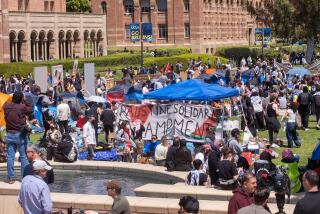CLASSICAL MUSIC / KENNETH HERMAN : UCSD Musicians Draw Raves, Rage in Germany
- Share via
UC San Diego’s music department may not be the bunch of wild-eyed iconoclasts of earlier days, but the 50-member delegation of musicians that descended on West Germany’s Darmstadt contemporary music festival last month still managed to raise a few eyebrows. After an appearance by (The), a performance-art duo with a decidedly Dadaist sense of humor, one of the European festival participants upbraided (The) member Ed Harkins.
“He was shocked at (The). He told me that we had engaged in behavior entirely inappropriate for college professors,” Harkins said. “He didn’t even realize that I was not only a faculty member, but acting chairman of the department. They have such a class thing about the academic world and its hierarchy.”
This dissenting word was not typical of the general reaction to (The), however.
“They kept applauding and wanted an encore, for which we were not prepared, since we expected tomatoes,” Harkins said.
Another UCSD performer to draw the ire of European new music enthusiasts was violinist Janos Negyesy. Negyesy’s specialty is playing a specially designed electric violin whose sounds are manipulated and transmuted by a technician working an on-stage computer.
“There was a small group that would boo whenever Janos appeared on the platform,” said Harkins.
Otherwise, the new compositions played by SONOR, the department’s contemporary-music performing ensemble, as well as those by other UCSD musicians, were received with equanimity.
“I would say that the impact we made was strong, although not all the reactions were positive,” said Cecil Lytle, SONOR member and recently appointed provost of UCSD’s Third College.
“What surprised our German hosts, however, was the diversity of contemporary musical styles that coexist at UCSD, and that SONOR could play such diverse music with equal conviction.”
Lytle pointed out that in Europe, similar-minded composers tend to flock to a single city or university and to view other compositional schools as the enemy.
“They like to attach a political interpretation to a style of music,” explained Lytle. “A group of German minimalists from Cologne took me aside and told me that they liked the Robert Erickson pieces we had brought. ‘But why do you do Roger Reynolds? We don’t want to hear any more of that heavy, communist music,’ they complained.”
Attempting to deflect their slurs on Reynolds’ work, Lytle explained that eclecticism was considered a virtue in American academic circles, or at least at UCSD.
“We don’t need to be at war with people who espouse a different compositional style,” he said.
Two UCSD graduate students won prizes at Darmstadt: Chaya Schwarz for composition and violinist Mary Oliver for performance.
More UCSD kudos. Bertram Turetzky, professor of music and noted contrabass performer, has been awarded a 1988-89 American Society of Composers, Authors and Publishers award for musical composition. Although Turetzky is better known for commissioning new works for his unlikely solo instrument--he has had more than 200 contrabass pieces written for him--he has also done a fair amount of composition on his own.
“I’m really a performer,” said Turetzky. “The hardest part of composition for me is finding time to compose, which is pretty rare. I’m too busy learning some new piece.”
Turetzky received an unexpected tribute last month at the International Society of Bassists convention held in Los Angeles.
“Without telling me anything about it beforehand, my former teacher David Walter of Juilliard performed one of my recent pieces, ‘Collage I,’ at the conference.” Turetzky was equally pleased with the applause for his “Reflections on Ives and Whittier,” which he performed at the Darmstadt contemporary music festival in West Germany.
According to Fran Richards of the ASCAP’s New York office, the 40,000-member organization makes several hundred awards annually in both the serious and popular music categories.
“They are essentially a sign of recognition by peers and colleagues,” she said.
Orchestral humor. When local conductor David Amos was in England earlier this summer making a recording of music by American composer Alan Hovhaness, he created an unexpected stir when he announced one of the titles to the Philharmonia, the London orchestra that was making the record.
“We had just finished one piece, and I matter-of-factly told them to take out ‘And God Created Great Whales,’ which is one of Hovhaness’ best-known pieces in our country. All of a sudden cheers broke out in various parts of the orchestra, so I asked the concertmaster what I had said to cause the disturbance. ‘It’s because many of our players are Welsh,’ he answered with a smile.”
More to Read
The biggest entertainment stories
Get our big stories about Hollywood, film, television, music, arts, culture and more right in your inbox as soon as they publish.
You may occasionally receive promotional content from the Los Angeles Times.










